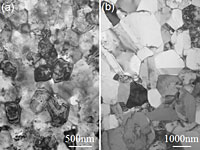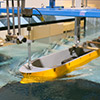Structural Materials
Department of Materials, Faculty of Engineering
Department of Materials, Graduate School of Engineering
Department of Materials, School of Engineering
The role of structural materials is to maintain the shape and function of structures around us, such as buildings, railroads, ships, and automobiles, and to protect the safety of the people who use them. To fulfill this role, excellent mechanical properties are essential for structural materials, but the properties required vary depending on the application. For example, steel frames supporting ships and buildings must have the toughness to withstand large impacts and earthquakes. These properties of structural materials are closely related to their metallurgical structure, and it is possible to bring out the required performance by controlling the metallurgical structure. This is the reason why we have been developing new materials with high strength and high biocompatibility. In our laboratory, we control and evaluate the microstructures of structural materials at the micro- and nano-scale to develop steel plates that combine strength and ductility, tough steels that do not fracture even at extremely low temperatures, light and strong titanium alloys, high-strength stainless steels with excellent oxidation resistance and corrosion resistance, and high-tensile steels with excellent corrosion resistance. We aim to create new structural materials that support future technologies, such as steel plates that are strong and ductile, tough steels that do not fracture at cryogenic temperatures, light and strong titanium alloys, high-strength stainless steels, and medical materials that are gentle to the human body.

The iron with nano grain size formed by special microstructural control (a) Ferritic iron, (b) Austenitic iron
Staff
Prof. Toshihiro Tsuchiyama
Assoc.Prof. Takuro Masumura
Asst.Prof. Yasuhito Kawahara
The Main Research Topics
- Fundamental study for strength, deformation and fracture in steel
- Development of high tensile strength steels with high ductility and toughness
- Microstructure control of stainless steels and titanium alloys
- Metallographic analysis by various technical method













